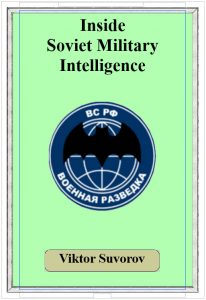THERE IS BUT ONE OPINION as to which country in the world possesses the most powerful secret intelligence service. Without the slightest doubt that country is the Soviet Union, and the name of the monstrous secret organisation without precedent in the history of mankind is the KGB. But on the question as to which country possesses the second most powerful secret organisation, the opinions of specialists differ. Strange as it may seem, the country to which this organisation belongs is also the Soviet Union, and the organisation itself is called the Chief Intelligence Directorate of the General Staff.
This book was written in order to confirm this simple fact.
At first it was conceived as an instructional manual for a narrow circle of specialists. Subsequently it was revised by the author for a wider public. The revision was confined mainly to the excision of certain definitions and technical details which would be of little interest. Even after this, there remained in the book many details of a technical nature, which may sometimes make for difficult reading. But though I may apologise, there is nothing to be done. In order to understand a disease (and the desire to understand a disease implies a desire to fight against it), one must know its pathology as well as its symptoms.
For one of their very first chosen myths, the communists decided to record that the organs of enforcement of the new State were not created until the nineteenth of December 1917. This falsehood was circulated in order to prove that Soviet power, in the first forty-one days of its existence, could dispense with the mass executions so familiar to other revolutions. The falsehood is easily exposed. It is sufficient to look at the editions of the Bolshevist papers for those days which shook the world. The Organs and subsequent mass executions existed from the first hour, the first minute, the first infantile wail of this Soviet power. That first night, having announced to the world the birth of the most bloodthirsty dictatorship in its history, Lenin appointed its leaders. Among them was comrade A. I. Rikov, the head of the People’s Commissariat for Internal Affairs which sounds less innocuous in its abbreviation, NKVD. Comrade Rikov was later shot, but not before he had managed to write into the history of the Organs certain bloody pages which the Soviet leadership would prefer to forget about. Fifteen men have been appointed to the post of Head of the Organs, of which three were hounded out of the Soviet government with ignominy. One died at his post. One was secretly destroyed by members of the Soviet government (as was later publicly admitted). Seven comrades were shot or hanged, and tortured with great refinement before their official punishment. We are not going to guess about the futures of three still living who have occupied the post. The fate of the deputy heads has been equally violent, even after the death of comrade Stalin.
